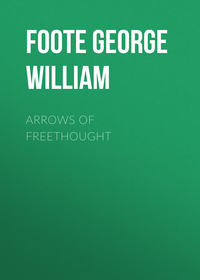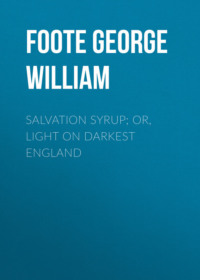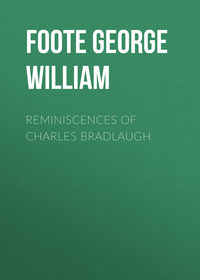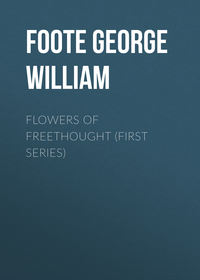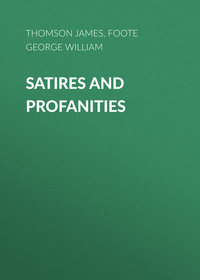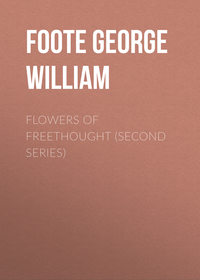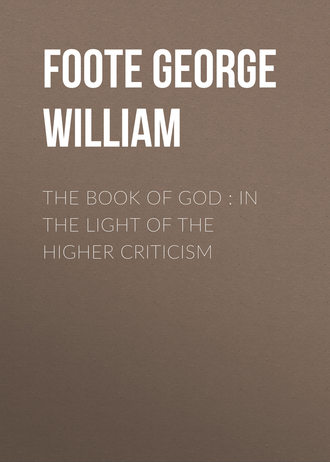 полная версия
полная версияThe Book of God : In the Light of the Higher Criticism
A good husband, a good father, a good neighbor, a good citizen, he has committed the crime of practically believing what Dr. Farrar and the rest of the clergy facetiously preach – namely, that the Bible is the Book of God, and the divine rule of faith and conduct. For this crime he is imprisoned under the verdict of a Christian jury and the sentence of a Christian judge; and not a single Christian minister raises his voice against this infamous spectacle. Christianity is now only an organised hypocrisy. It subsists upon an inherited fund of power, wealth, and reputation. Even the clergy have no vital belief in the inspiration of the Bible. It is merely the charter under which they trade. It is a source of oracular texts for their ambiguous sermons. It is lauded and adored, and neglected and defied. To bring it into disbelief and contempt by argument and ridicule is a misdemeanor; to bring it into disbelief and contempt by acting upon it is a felony. The only safe course is that adopted by the clergy, who neither believe it nor disbelieve it, but use it as it serves their occasions; and as long as it answers their ends it will remain the Book of God.
Let us not be misunderstood. We are far from desiring to engage in a crusade against the Bible as a collection of ancient literature. We are neither called upon nor disposed to deny its real merits, however they are exaggerated in religious circles. It undoubtedly contains some fine poetry, occasional pathos, and more frequent sublimity. Its style has nearly always the charm of simplicity. All this may be allowed without playing into the hands of the super-naturalists. Further than this we need not go. In our opinion, it is absurd to place the Bible at the top of human compositions. More than sixty writers are alleged to have contributed to its production, but the whole mass of them do not rival the magnificent and fecund genius of Shakespeare. Above all, they have no wit or humour, in which Shakespeare abounds; and wit and humor belong to the higher development of intellect and emotion. No, the Bible is not the unapproachable masterpiece which it is declared to be by its fanatical devotees. But whatever its intrinsic merits may prove to be, in the light of long and free appreciation, the Bible cannot be accepted as a revelation from God without wilful self-delusion on the part of educated men and women. If God had a message for his children, he would at least make it clear; but this revelation needs another revelation to explain it, and creeds and commentaries are the symbols of its obscurity. God's message would tell us what we could not otherwise learn, but there is no such information in the Bible. God would apprise us of what he specially desired us to remember, and would not mix it confusedly with a tremendous mass of alien matter. God would not puzzle us; he would enlighten us. He would make his communication so clear that a wayfaring man, though a fool, could understand it; whereas, if the Bible be his communication, no wayfaring man, unless he is a fool, pretends to understand it. God would not clog his message with myths, legends, mysteries, absurdities, falsehoods, and filth; and leave us to extricate it with endless labor and perpetual uncertainty. The so-called Higher Criticism is therefore as absurd as the old Orthodoxy in calling the Bible a work of inspiration. Its exponents affirm that God has left us to our own knowledge and reason in regard to every other subject but religion and morality. They are Evolutionists in part. But the principle of Evolution must be applied over the whole field. Everything is natural, and happens under the universal law of causation. There are no miracles, and there never were any except in ignorant imaginations. But the death of miracles is the death of inspiration. The triumph of science involves the ruin of every supernatural system. Revelation is necessarily miraculous, and when the belief in miracles expires the death-knell rings for every Book of God. We are then left to the discipline of culture.
And what is culture? It is steeping our minds in the wisest and loveliest thoughts of all the ages. And each of us may thus make his own Bible for himself – a true Bible of Humanity.
1
Arnold, God and the Bible, pp. 222-3.
2
Dr. Giles, Christian Records, p. 10.
3
It would be a pity to omit an amusing instance of the contemptuous dogmatism of Christian divines when they had the field to themselves. Dr. William Whitaker, a famous learned writer on the side of the Reformation in England, in his Disputation with two of the foremost Jesuits, Bellarmine and Stapleton, wrote as follows: – "Jerome, in the Proem of his Commentaries on Daniel, relates that Porphyry the philosopher wrote a volume against the book of our prophet Daniel, and affirmed that what is now extant under the name of Daniel was not published by the ancient prophet, but by some later Daniel, who lived in the times of Antiochus Epiphanes. But we need not regard what the impious Porphyry may have written, who mocked at all the scriptures and religion itself." Well, this opinion of the blasphemous Porphyry, whose writings were burnt by the Christian Church, is now accepted by the Higher Critics. Canon Driver, for instance, admits that the Book of Daniel is not the work of Daniel, that it could not have been written earlier than 300 B.C., and that "it is at least probable that it was composed under the persecution of Antiochus Epiphanes, B.C. 168 or 167" (Introduction to the Literature of the Old Testament, p. 467). This involves that the fulfilled prophecies of Daniel were written after the events.
4
We cannot elaborate this point in a publication which is intended for general reading. Suffice it to say that one famous commentator suggests that Eve was seduced by an ape.
5
Christian Apologetics, p. 309.
6
Matthew xix. 7, 8; Mark x. 3, 4; xii. 26; Luke xvi. 29-31; Luke xx. 37; John v. 45, 46; vii. 19, 22, 23.
7
Matthew xxii. 43-45; Mark xii. 36, 37; Luke xx. 42-44.
8
Professor W. Sanday, Bampton Lectures on Inspiration, p. 409. Canon Gore, with this utterance of Jesus right before him, still more emphatically denies that this Psalm was, or could have been, composed by David. See his Bampton Lectures on The Incarnation of the Son of God, p. 197.
9
Rev. Charles Gore, Lux Mundi (seventh edition), pp. 360, 361.
10
Introduction, Preface, xix.
11
Canon H. P. Liddon, The Divinity of Christ (fourteenth edition), p. 462.
12
Timothy iii. 16.
13
2 Peter i. 19-21. We quote this epistle as Peter's, because it passes as his in the New Testament, not because it was really his writing.
14
Max Müller, Natural Religion, p. 538.
15
Natural Religion, p. 295.
16
Max Müller, ibid, p. 558.
17
Sir William Muir, Rise and Decline of Islam, pp. 40, 41.
18
T. W. Arnold, The Preaching of Islam.
19
Flaubert, Correspondence, vol. i., p. 344.
20
James Cotter Morison, The Service of Man, p. 178.
21
George P. Marsh, Lectures on the English Language (Murray), pp. 441, 445.
22
John Wesley's Works (1865), vol. xi., pp. 464-465.
23
Time and Tide, pp. 48, 49. It should be noted that the Letters in this pregnant little volume were written by Ruskin as far back as 1867.
24
Huxley, Science and Christian Tradition, pp. xv., 25, 54, etc.
25
John Henry Newman, University Sermons, p. 71.
26
Matthew Arnold, Letters, vol. ii., p. 201.
27
Examen Critique de St. Paul, c. 3.



